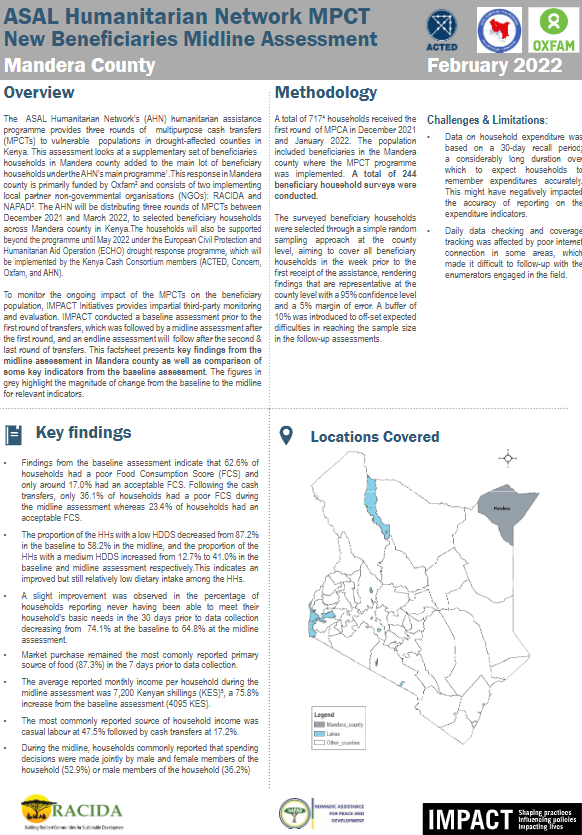ASAL Humanitarian Network (AHN)
ASAL Humanitarian Network – Drought Response Results
Cash Transfers Improve Food Security and Household Wellbeing in Mandera County
Midline Assessment – February 2022
The ASAL Humanitarian Network (AHN), through its Oxfam-supported drought response programme, implemented three rounds of multi-purpose cash transfers (MPCT) in Mandera County, targeting vulnerable households severely affected by prolonged drought. The initiative, implemented locally by Nomadic Assistance for Peace and Development (NAPAD) and Rural Agency for Community Development and Assistance (RACIDA), formed part of AHN’s early action and humanitarian response across Kenya’s ASAL counties, supported by Oxfam, Concern Worldwide, and ACTED.
Results from the midline assessment conducted by IMPACT Initiatives show clear improvements in food security and household coping capacity:
Food Consumption Score (FCS): acceptable levels increased from 17% to 23.4%, while poor FCS dropped from 62.6% to 36.1%.
Household Dietary Diversity Score (HDDS): low dietary diversity declined from 87.2% to 58.2%, with medium dietary diversity rising from 12.7% to 41%.
Average monthly income rose from KES 4,095 to KES 7,200, and expenditure from KES 5,716 to KES 6,641, driven by the cash transfers.
Reduced Coping Strategy Index (rCSI) decreased from 21.5 to 18.5, indicating a lower reliance on negative coping mechanisms.
Households primarily relied on market purchases (87%) for food and casual labour (47%) as their main income source. Spending patterns diversified, with higher allocation to medicine (17%), debt repayment (12%), and education (7%).
Protection indicators show strong programme accountability: all households reported feeling safe during registration, no payment for inclusion, and respectful treatment by NGO staff. Over 62% of respondents said they had been consulted about their needs, and 98% were satisfied with responses to any complaints raised.
These findings highlight the effectiveness of locally led cash interventions in improving food security and livelihoods while upholding dignity and transparency in humanitarian response.

